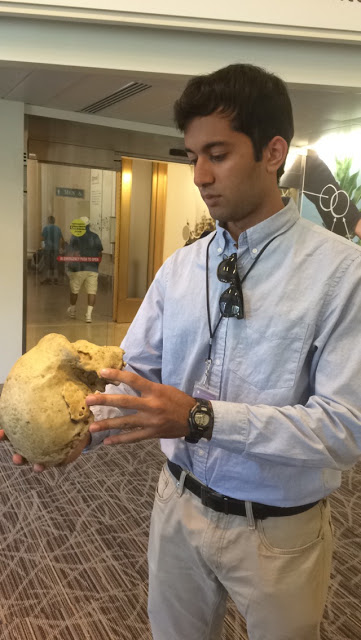- Public Policy
- Leadership
- Funding
- News & Events
- About the Center
Back to Top Nav
Back to Top Nav
Back to Top Nav
Back to Top Nav
This past summer, I worked at the Smithsonian Institution's Office of Policy & Analysis (OP & A). The Smithsonian Institution’s mission is to increase knowledge and inspire learning about nature and culture through outstanding research, collections, exhibitions, and education in support of a sustainable future. Within the Smithsonian Institution, the OP & A serves as a medium for museum improvement by conducting research, evaluations, and needs assessments for the various clients both in and outside the Institution. Research often involves the creation and use of surveys, observations, and statistical analysis (both qualitative and quantitative). Unlike the Smithsonian’s museums, OP & A is not exhibition-driven, but data-driven.
 |
| Prehistoric parallels at the Museum of Natural History. |
At the OP & A, I also became acquainted with the subtleties of conducting interviews. Distinctions I had never previously considered or thought of as particularly relevant—cued vs. uncued, structured vs. unstructured, formal vs. conversational—suddenly mattered. I learned that the power of a study is only as good as the accuracy of its data, which depends directly on the precision of its methodology. As such, interviews (a common way of acquiring qualitative data) have to be appropriately conducted; the interviewer must be careful not to introduce any biases in phrasing or inflection that could sway the interviewee’s opinion and skew the data. In a research setting, this is tremendously important to keep in mind.
Although I have learned a lot during my summer internship, the most rewarding part of the summer wasn’t work related at all. On the morning of June 26, 2015, some friends and I walked to the grounds outside the Supreme Court and waited for several hours to hear its ruling on same-sex marriage. When word reached the crowd that the Court had ruled in favor, parts of the crowd were ecstatic; others looked disappointed. Either way, nobody could deny that the case was a landmark moment in American history. The opportunity to be a part of that moment was incredible, and it’s certainly a morning I will never forget.